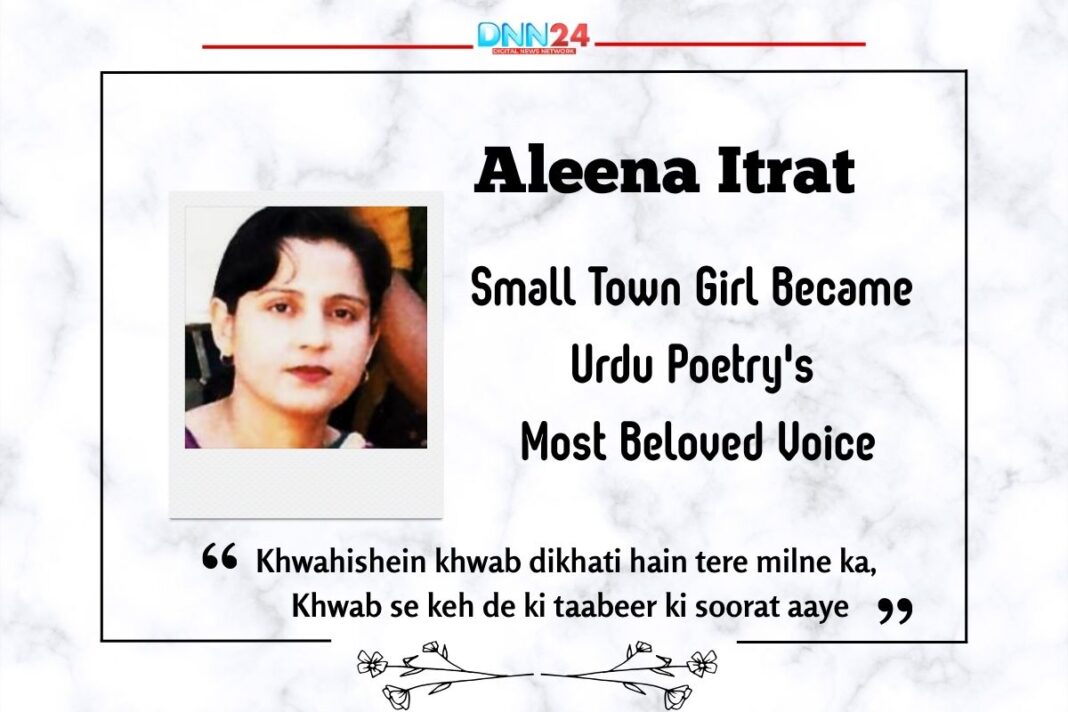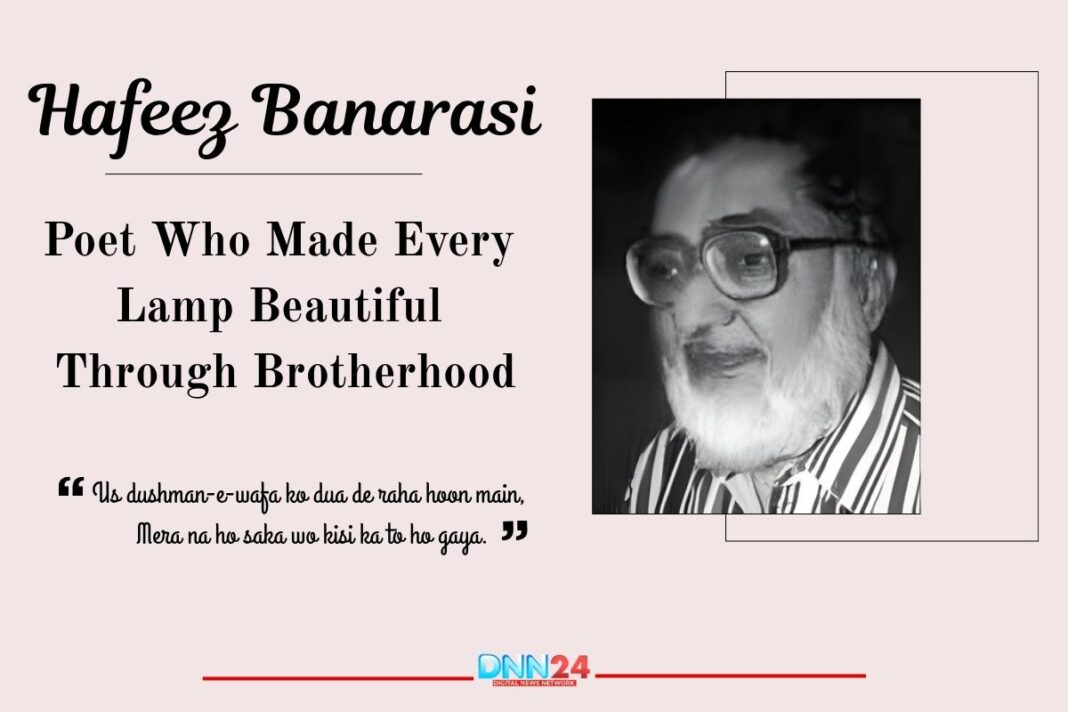Aleena Itrat was born on June 6 in Nagina, a small town in the Bijnor district of Uttar Pradesh. Her arrival was ordinary, but the world she entered was anything but, Poetry flowed through her home like air itself. Her sisters, Meena Naqvi and Dr Nusrat Mehdi, were already creating beautiful verses in Urdu. As a little girl, Aleena would sit quietly in corners, listening to their readings.
Udaasi shaam, tanhaai, kasak yaadon ki bechaini,
Aleena Itrat
Mujhe sab saunp kar sooraj utar jaata hai paani mein.
She absorbed every sound, every pause, every emotion that those words carried. The rhythm of Urdu became her lullaby. While other children played outside, she found herself drawn to notebooks and pencils. She began writing small verses, unsure of where they would lead. Her family noticed her talent early, yet they never forced it upon her. Instead, they let it grow naturally, like a plant finding its own way toward sunlight.
Shadid dhoop mein saare darakht sukh gaye,
Aleena Itrat
Bas ek dua ka shajar tha jo be-samar na hua.
Those early years shaped her completely. She learned that poetry was not about showing off or seeking attention. It was about feeling deeply and expressing honestly. Her modest upbringing taught her humility. Her literary family gave her wings. Together, these forces laid the foundation that would later support her entire career as one of modern India’s most respected Urdu poets.
Abhi to chaak pe jaari hai raqs mitti ka,
Aleena Itrat
Abhi kumhar ki niyyat badal bhi sakti hai.
The Student Who Chose Words Over Everything
School life brought Aleena face-to-face with the practical world. She studied English Literature and History, subjects that broadened her understanding of human experience across cultures and centuries. Later, she completed her B.Ed., preparing herself for a career in teaching. Many people around her wondered why a talented poet would choose the classroom over the stage. For Aleena, the answer was simple. Teaching gave her stability.
Jin ke mazboot iraade bane pehchaan unki,
Aleena Itrat
Manzilen aap hi ho jaati hain aasan unki.
It allowed her to stay close to language every single day. More importantly, it kept her grounded in reality while her poetry explored dreams and emotions. Her students remember her as a calm presence. She never shouted or demanded attention. Her lessons flowed smoothly, much like her verses. During lunch breaks, she would sometimes share a couplet or two, making literature feel accessible rather than distant. But her nights belonged entirely to poetry.
Apni mutthi mein chhupa kar kisi jugnu ki tarah,
Aleena Itrat
Hum tere naam ko chupke se padha karte hain.
After finishing school preparations and household duties, she would sit with her pen and paper. The words came slowly at first. She faced rejection from magazines and literary journals. Some editors found her style too simple; others thought it lacked the dramatic flair that audiences expected. These setbacks hurt deeply, but she refused to change her voice to please anyone. She believed in her craft. She trusted that authenticity would eventually find its audience. And so she continued, year after year, building her collection of verses quietly.
Koi aawaaz na aahat na koi halchal hai,
Aleena Itrat
Aisi khamoshi se guzre to guzar jaayenge
When Recognition Finally Arrived
Everything changed when “Takmeel” got published in Aalami Sahara, a respected Urdu magazine. This was not just her first published poem; it was also her first published work. It was proof that her voice mattered. Readers responded warmly to her words. They found something genuine in her verses, something that touched them without effort. Critics began noticing her work. They appreciated how she avoided unnecessary complexity.
Koi mila hi nahin jis se haal-e-dil kahte,
Aleena Itrat
Mila to reh gaye lafzon ke intikhaab mein hum
Her language was clean, her emotions were honest, and her imagery felt fresh. Soon after, her first poetry collection, Suraj Tum Jao, was released in bookstores across India. The title itself carried her sensibility perfectly. It meant “Sun, You May Go,” reflecting both acceptance and a sense of hope. The book received excellent responses. Prestigious institutions, including the Delhi Urdu Academy and the Bihar Urdu Academy, bestowed awards.
Hijr ki raat aur poora chaand,
Aleena Itrat
Kis qadar hai ye ehtimaam ghalat.
For someone who had spent years writing in silence, this recognition felt overwhelming. Yet Aleena remained unchanged. She did not let success alter her personality or her approach to poetry. She continued teaching, continued writing at her own pace, and continued treating every verse as if it were her first.
Zinda rehne ki ye tarkeeb nikaali maine,
Aleena Itrat
Apne hone ki khabar sab se chhupa li maine.
Those close to her were aware of the struggles she had faced. Being a female poet in India’s Urdu literary circles was never an easy task. Mushairas often favoured loud performances over quiet depth. But Aleena never compromised. She read her poetry softly, allowing the words to speak for themselves rather than relying on her delivery.
Har ek sajde mein dil ko tera khayal aaya,
Aleena Itrat
Ye ek gunaah ibaadat mein baar baar hua.
Poetry That Heals and Transforms
Aleena’s verses carry multiple layers. On the surface, they speak of everyday emotions. But beneath that simplicity lies profound wisdom. Her ghazals move between joy and sadness with remarkable grace. She once wrote about how even autumn’s pale colours can become vibrant again. This line was not just poetic beauty. It reflected her personal journey of turning pain into hope.
Ishq mein fikr to deewana bana deti hai,
Aleena Itrat
Pyaar ko aql nahin, dil ki panaahon mein rakho
She has faced losses, disappointments, and moments of profound loneliness. After losing a close friend, she wrote about a prayer tree that never fails to bear fruit. These words became her anchor during difficult times. Her poetry does not hide from suffering. Instead, it walks through darkness while holding onto light. Readers find comfort in her verses because they recognise their own struggles within them.
Jab bhi fursat mili hangama-e-duniya se mujhe,
Aleena Itrat
Meri tanhaai ko bas tera pata yaad aaya.
Her work never preaches or instructs. It simply shares what the heart experiences when life becomes too heavy. Critics call her a pure craftswoman of emotions. Her ghazals are not written for applause or fame. They exist to give voice to feelings that often remain unexpressed.
Theek hai jao, taalluq na rakhenge hum bhi,
Aleena Itrat
Tum bhi waada karo ab yaad nahin aaoge
When she performs at Mushairas, her reading style matches her writing. There is no drama, no exaggeration. Just warmth, deliberate pacing, and a prayerful quality that makes audiences listen differently. In a world where louder often means better, Aleena proved that whispers can reach just as far.
A Legacy Built on Gentle Strength
Today, Aleena Itrat stands as an essential figure in contemporary Urdu poetry. She bridges the gap between classical traditions and modern sensibilities. Her work respects the rich history of Urdu literature while bringing fresh perspectives to it. She continues teaching, never separating her art from her everyday responsibilities. In classrooms and on literary stages alike, her humility shines brighter than any award.
Baad muddat mujhe neend aayi bade chain ki neend,
Aleena Itrat
Khaak jab odh li, jab khaak bichha li maine.
She belongs to that rare group of poets who write not for immortality but to capture what it means to be human. Every poem she creates acts as a mirror. It reflects emotions gently, without judgment or exaggeration. Behind all the recognition lies a woman who stumbled many times, rose again each time, and found herself repeatedly through words. Her life was never about wealth or the spotlight.
Tujh ko aawaaz du aur door talak tu na mile,
Aleena Itrat
Aise sannaton se aksar mujhe dar lagta hai.
It was always about faith, perseverance, and deep love for the Urdu language. When Aleena writes, the world seems to pause briefly. People listen to this woman, who carries centuries of tenderness within her, while she writes with the strength of pure light. For her, poetry is not an escape from reality.
Hum hawa se bacha rahe the jinhe,
Aleena Itrat
Un charaghon se jal gaye shayad.
It is her way of staying truly alive, her method of saying that even fading moments hold their own exceptional beauty. Aleena Itrat remains not just a name in literary circles. She stands as living proof that words can heal wounds, that silence can blossom into meaning, and that one person’s journey can transform pain into poetry that continues to shine softly, endlessly, touching hearts across generations.
Also Read: Bilqis Zafirul Hasan: The Poet Who Found Her Voice in Silence
You can connect with DNN24 on Facebook, Twitter, and Instagram and subscribe to our YouTube channel.



